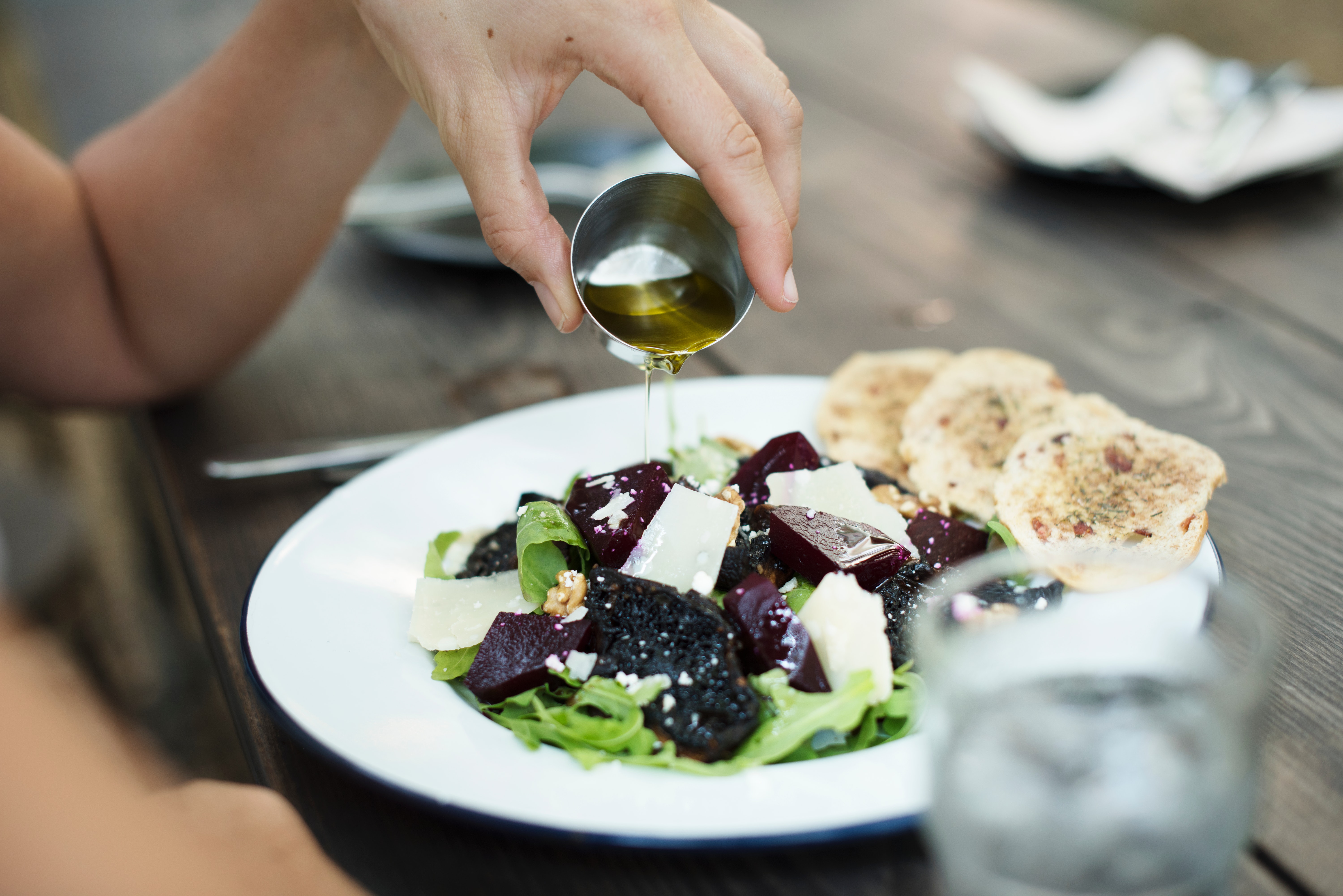You asked, we listened. Follower question of the week.

Q: What’s the deal with olive oil? The app says it’s “0” when I record it…is it a free food?
A: No! Olive oil, or any other type oil for that matter, is NOT a free food on F-Factor. That doesn’t mean its off limits, but it doesn’t mean you shouldn’t pay attention to how much you’re using either. To learn why it’s journaled the way it is, what that means for you, and where it fits into your diet, read on.
OLIVE OIL IS A FAT, SO IT IS JOURNALED AS 0g NET CARBS
Because oils are fats, they fall under the non-carbohydrate category on F-Factor (along with non-starchy vegetables and proteins). This is because fats do not contain any carbohydrates. Olive oil, specifically, is a monounsaturated fat, which along with polyunsaturated fats, is a “good” fat, and the most heart healthy of the fats. Saturated fats are the fats that most linked to heart disease. For reference, peanut and canola oil, nuts and avacado are also monounsaturated fats; corn, saffron and soybean oil are polyunsaturated fats.
By nature of being a fat, olive oil does not contain any carbohydrates or fiber. Therefore, it is journaled as 0g carb, 0g fiber. This is also why when you enter it in the app, regardless of the quantity you are logging, it will come up as 0g net carbs.
CARB FREE DOES NOT EQUAL CALORIE FREE
Anything that is 0g net carbs won’t impact your daily net carb total. However, that does not mean it doesn’t contribute calories, and certainly doesn’t mean it doesn’t need to be taken into consideration day to day. Oil, along with any food that is journaled as 0g net carb still plays a role in your weight management equation. In other words, you cannot have unlimited amounts of it.
A free food on F-Factor is something you can eat unlimited amounts of and still lose or maintain your weight. All “free foods” on F-Factor have 0g of carbs, but not all foods that we count as 0g of carbs on F-Factor are free foods. The only free foods on F-Factor are non-starchy vegetables (to read why non-starchy vegetables are a free food on F-Factor, click here).
The reason a carb-free food, like olive oil, still needs to be taken into consideration is calories. One of the reasons non-starchy vegetables are a free food on F-Factor is that they’re relatively low in calories (~25 calories for an entire cup), and that’s just not the case with oil. Just one tablespoon of oil is 135 calories, and 15g of fat. One tablespoon is a very small amount, especially when you compare that to the entire cup of vegetables. Extra calories—whether they’re from fat, carbs or protein—overtime, will still lead to weight gain.
It’s also important to keep in mind here that oil adds up quickly, and this is where it can become a bit problematic for weight management. Just one tablespoon is 135 calories. Two tablespoons then is 270 calories (and 30g fat), and an entire quarter cup? That’s an additional 540 calories, and 60g of fat! As anyone who has ever used olive oil in cooking before would know, it can be all to easy to use more than one measly tablespoon.
Restaurants prepare foods with a lot of oil, there’s not much we can do about that. Therefore, at home, control oil use when you can. When cooking, opt for a 0 calorie olive oil spray.
BUT ISN’T OLIVE OIL A GOOD FAT?
You’re right. This is not to say that olive oil is completely off limits by any means. You need some fat in your diet. Olive oil is a monounsaturated fat. When choosing fats, you want to aim for the fats listed on the monounsaturated lists, as they are the most heart healthy.
However, there is a difference between healthy and healthy for weight loss. As noted above, olive oil is a food that can add up quickly, and that can impede weight management efforts, even if the calories come from a “healthy” food. Read more about the difference between health and healthy for weight loss here.
SO HOW MUCH CAN I HAVE?
The recommendation on fats is to opt for the unsaturated fats and simply use them in moderation. F-Factor isn’t a no-fat diet, it’s a low fat diet. A little bit of fat at each meal helps to slow down digestion and keep you feeling fuller for a longer period of time than a meal that does not have fat.
While F-Factor does not require you to count grams of fat, as it does with carbs and fiber, you do want to keep a watchful eye on how much fat you’re consuming. Roughly 30% of your calories per day should come from healthy fats, which equates to ~33g of additional fats if you are on Step 1 of the F-Factor Diet. Please note, these ~33g of fat are additional fats, meaning on top of healthy fats in lean proteins, like grass-fed beef, fish and low-fat dairy. Olive oil is included in this category of additional fats.
- Just because something comes up as 0g carbs in the app, or falls under the non-carbohydrate category, does not mean it’s a free food and even though your journal (daily net carb total) isn’t impacted by oil, you cannot have unlimited amounts.
- A food that does not contribute carbohydrates to your daily net carb total still contributes calories, and still plays a role in the weight management equation.
- We need fat in the diet. A little bit of fat at each meal helps to slow down digestion. If weight loss is your goal, aim for no more than 33g of additional fats in your diet per day.
- Olive oil is a healthy fat, but it does add up quickly, so be mindful of it.